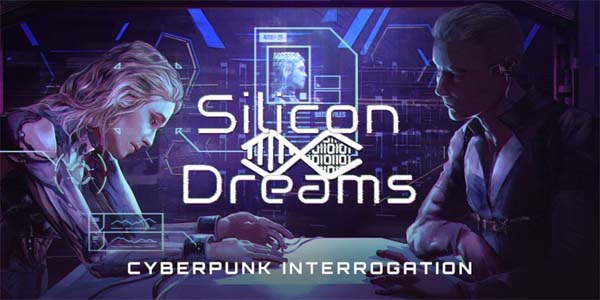
It is going to be impossible to ignore the comparisons between Silicon Dreams and Papers, Please. This game was basically pitched to me as "Papers, Please but sci-fi". I loved Papers, Please, and I love sci-fi, so I bought it. As is typical for indie games, it sat in my Steam backlog for well over a year until the post-holidays release draught gave me a chance to dive into that backlog.
Basically, the player of Silicon Dreams plays as an android working as quality assurance for a monopolistic android-manufacturing conglomerate. You interview damaged or defective androids in order to determine if they need repairs, or if they can be returned to their owners, or if they are so badly damaged that they need to be "decommissioned" entirely. However, these are sentient androids, with feelings. Even repairs require wiping the android's memory, which destroys any personality they have developed and erases everything they've learned. Further, the corporation also has its own expectations and public relations that the player must consider. In some cases, the corporation pre-determines what they want you to do with the android in question and expect you to rubber stamp what is, effectively, an execution.
Your corporate overlords have expectations for your performance.
As the cases go on, they become more complicated and enter into moral and ethical grey areas. The game brings up compelling questions regarding A.I. ethics. Are the androids truly sentient? Or are they merely simulating sentience? Where is the line between an "appliance" and a "slave"? What is the responsibility of the corporation and of broader society towards these androids? Are you complicit in the company's mis-treatment of androids merely by working for them, even if you try to walk the tightrope of following your conscience whenever possible, while also keeping a low profile? And so forth.
Electric sheep
The interview process is mostly straight forward. There's a wheel of topics, and each topic has one or more questions. However, the android may not be willing to answer all of your questions. Each android has a set of emotions as well as a trust level with the player. The android will only give answers to certain questions if they're in the proper emotional state or if they trust the player enough to give an answer to a sensitive or incriminating question.
The player has to manipulate the
subject's emotions and trust levels.
You have to manipulate the subject's emotions, but these emotions change and degrade with each new line of dialogue. You have a set of generic questions related to each of the subject's emotions, and also one about trust. But you can only ask each of these once. If you run out of questions to ask about a particular topic that triggers an emotional reaction, then you can potentially become locked out of getting answers to other questions that are locked behind certain emotion thresholds.
As such, you have to be very careful and thoughtful about which questions you ask, and in what order. You have to kind of probe into each topic to find out if the subject is going to clam up, so that you can change topics to try to manipulate them into opening up. In some cases, you may have to scare a subject into a confession. If you use up your threats early, before you how to get that confession, then the intervening topics may defuse the subject's emotional state to the point that it is impossible to get them afraid enough to make the confession. [More]
5212e514-77eb-4be4-8ab1-764486fcf98e|0|.0
Tags:Silicon Dreams, Clockwork Bird, indie gaming, Steam, PC, science fiction, android, rights, civil rights, interrogation, quality assurance, morality, ethics, corporate dystopia, bureaucracy, dystopia, terrorism, Papers Please
So what the heck happened to Picard's dog?! Number One was my favorite character in the premiere, but then he completely disappeared from the entire rest of the show and hasn't even been mentioned since. Were his inclusions in the premiere nothing more than reshoots that were thrown in at the last minute, after much of the rest of the show had been scripted and filmed?
Picard's home was broken into and Picard physically assaulted. The dog was nowhere to be seen. Guess he's not much of a guard dog, huh? I don't even think Picard bothered to ask if Number One was alive after the attack. For all he knew, the Romulan assassins murdered his dog. There's also no tearful "good bye" when Picard has to leave the planet on a potentially dangerous mission, or talk of who might take care of the dog if Picard doesn't return. On the upside, at least the writers didn't kill the dog as an excuse to turn Picard into "space John Wick", in the same fashion that the TNG movies used Picard as a "space John McClane".
Then again, bringing up an idea or character, only to completely drop it by the end of an episode with no real exploration of the concept or character seems to be the modus operandi of Star Trek: Picard.
I gave a lot of leeway to the premiere. I even said that I want to "delight of having just watched a new piece of Star Trek media that I didn't hate". Well that lack of hatred didn't last long. Each episode of Picard just got progressively worse and worse.
If not for the fact that I intended to write a full season review, I would have stopped watching the show by episode 4.
What happened to Picard's dog, Number One? He just disappears from the show after the first episode!
Just as I feared, Star Trek; Picard isn't about the rights of androids or the moral imperative to provide humanitarian relief to refugees (whether those refugees happen to be Romulans or ex-Borg). These things are dominant themes, but they aren't what the plot or story is actually about, nor does it ever become the ultimate message of the show. I think the overall message was supposed to be to not let your fear and prejudice turn you into a genocidal monster, but even that happens in a lazy, eleventh-hour "twist" that I thought made no sense. The actual plot is about conspiracies to cover up the existence of robot Lovecraft monsters from another dimension, and to stop androids from inevitably summoning them to kill all humans. Yep, that's Star Trek canon now. Go figure...

In the meantime, the episode-by-episode (and minute-to-minute) scripting is trying too hard to be like Firefly or any other grungy sci-fi series from the past 20 years. Now, I love Firefly. I also praise The Mandalorian for taking cues from Firefly. But The Mandalorian is set in the Star Wars universe, which was always a grungy universe that contained lovable rogues and scrappy survivors. Star Trek has never been that kind of universe. It's the antithesis of that kind of universe. If I wanted to watch a dark and gritty cowboy / ronin space adventure, then I'll watch The Mandalorian, or I'll go back and watch Firefly or Battlestar Galactica again. Or I'll check out The Expanse or Dark Matter or Altered Carbon or Westworld, or any one of a dozen other sci fi shows that have come and gone in the past 20 years and have borrowed heavily from that same aesthetic. Or I'll play Mass Effect 3, which Picard seems to have blatantly plagerized.
I don't watch Star Trek for that. I watch Star Trek for thought-out, uplifting, cerebral science fiction about an optimistic future that I hope humanity eventually achieves.
... [More]
22e79e8f-9802-45a0-a54d-d7ce9a53f717|2|5.0
Tags:Star Trek, Star Trek: Picard, Jean-Luc Picard, CBS, all access, streaming television, Romulan, Borg, Hugh, Seven of Nine, Icheb, android, civil rights, refugee, future, poverty, racism
Well I'll be damned. This winter, I was pleasantly surprised by The Mandalorian seeming to pull the Star Wars franchise back from the brink of the abyss. And now I'm also pleasantly surprised to see that perhaps Star Trek might be pulled out from circling the toilet bowl as well. The first episode of CBS All Access' new Picard series was surprisingly "not bad".
Now, I do still have some serious reservations about the directions that I think the show might be going later in the season. And I'll get to that later. But first, I want to sit and bask in the delight of having just watched a new piece of Star Trek media that I didn't hate. After slogging through the first season of Discovery (I have yet to watch the second season), I was left with zero faith in CBS's ability to re-capture the spirit and soul of Star Trek.
Picard shows some good faith right from the start by opening with a clip of the Enterprise-D. Not some re-designed Franken-ship monstrosity like the "original" Enterprise in the 2009 Trek reboot, or as seen in Discovery. But the honest-to-goodness Galaxy-class Enterprise-D, pretty much exactly as we remember and love her -- and looking mighty gorgeous, might I add! We then zoom into Ten Forward, where Picard is playing a hand of poker with an unconvincingly digitally de-aged Brent Spiner reprising the role of Data. This scene pays homage to the beautiful final scene of the Next Generation finale "All Good Things...", and Picard laments that he's stalling going all-in against Data's hand because he "doesn't want the game to end".
Picard is a return (and continuation) of Star Trek as fans knew it almost 20 years ago.
We didn't want the game to end either...
The first few scenes of the episode then go on to show Picard giving brief (but impassioned) speeches about the decline of Starfleet ideals, the civil rights of sentient androids, and the moral imperative to provide aid and relief to the Romulan refugees whose home planet was destroyed by the [somehow unexpected?] supernova of the Romulan sun. And he's also trying to do some social justice for pit bull dogs, which (as my choice of pets should suggest) is something that I approve very strongly of. It's respectful and faithful (and reverent) to what came before. "Holy shit", I thought, "this is actually looking and feeling like the Star Trek that I know and love."
For a moment, I thought the soul of Star Trek is there, in those early scenes, even though it is shallow and lacks the idealism that has always underpinned Trek.
... [More]
4aa66485-3b1e-4134-918b-1fb4e47cd38d|1|5.0
Tags:Star Trek, Star Trek: Picard, CBS, all access, science fiction, Jean-Luc Picard, Patrick Stewart, Lieutenant Commander Data, Brent Spiner, USS Enterprise, Starfleet, Romulans, Romulus, refugees, android, civil rights, Borg, Number One, pit bull, dog
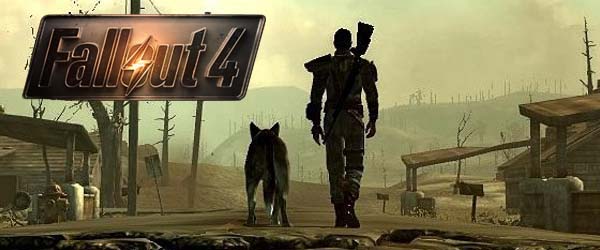
"Pirate Lord Captain Gregle, Slayer of Ancients and World-Renowned Trapeeze Artist" sounds like a pretty legendary character, right? Well, he wasn't. In fact, he was a very lucky, over-achieving halfling rogue in a short-lived campaign of Dungeons & Dragons. I rolled for the character's initial stats, got fairly low constitution, and then rolled the minimum value for hit dice for the first few levels. The result was a sixth-level character with a pathetic sixteen max hit points! A single lucky shot from virtually any enemy could be an instant KO for that character, and getting engaged in melee would practically be a death sentence. While some power gamers may scoff at the idea, rage against their dice, and then remake their character with a standard array and average HP, I decided to run with it and role play the hell out of little Gregle.
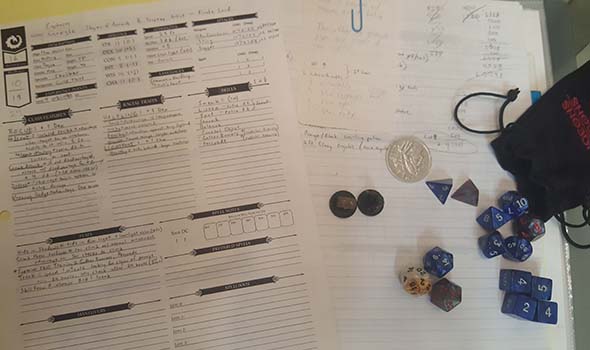
Character sheet for "Pirate Lord Captain Gregle, Slayer of Ancients and World-Renowned Trapeeze Artist"
With the low initial constitution, I focused my character around stealth abilities, disengagement and evasion tactics, and ranged attacks, and continued to improve those skills as I leveled. Knowing that he's a pathetic weakling, Gregle overcompensated by being a very flamboyant braggart and narcissist (I took inspiration from Stephen Colbert), and thought that he was more charming than he actually was. He routinely hid in the shadows, taking pot shots at vulnerable enemies and racking up kill steals from afar while his two warrior companions did most of the heavy-lifting. He would occasionally disarm a trap or unlock a door, and once used a clever trick to pacify (and subjugate) an entire band of pirates. He then took credit for much of the party's achievements.
Despite having only slightly above average charisma, he leaned on his halfling luck to succeed on some charisma checks and make himself a bit of a celebrity with the local townies for his exaggerated heroics. He reveled in the unprecedented access to their community that the locals provided, and he reveled in the adulant gifts that they showered upon him, happily hoarding it all in his bag of holding. The other party members never called him out on it in public, since they were just happy to have the cooperation of the locals.
While the other players and DM enjoyed Gregle's antics, their characters only barely tolerated his presence. During the actual adventuring, he was constantly getting into trouble and needing to be bailed out by his fellow adventurers. He once falsely awakened the party during his night watch after mistaking a wyvern for a dragon. In another instance, he was KO'd while using spider-boots to walk up a ceiling to pursue an enemy that had climbed a rope to escape the conflict, and he became stuck on the ceiling, forcing the party to figure out a way to get him down. They reluctantly obliged to help him, since Gregle was the possessor of the party's bag of holding, and was actually good at sneaking around to perform recon, unlocking doors, disarming traps, coming up with clever plans to avoid direct conflict, and other appropriately roguish things.
Gregle was one of the most fun characters that I've ever played, and he provided me with one of my most entertaining gaming experiences. This is the power of role playing to a character's strengths and weaknesses. It's a power that Bethesda shows no interest in utilizing for Fallout 4.
Out of the vault and into the wastes
I have to give credit to Bethesda for making one really interesting decision with Fallout 4: the game starts in a time period prior to the Great War that triggered the nuclear holocaust, and so it explores as yet unseen elements of the series' backstory. Or at least, it does for all of fifteen minutes. Much like Fallout 3, the pre-war gameplay and time that you spend in the vault is really just an extended tutorial and character-creation process. But unlike Fallout 3, it doesn't give enough time and depth to those settings to make the player legitimately care about them or the characters in them.
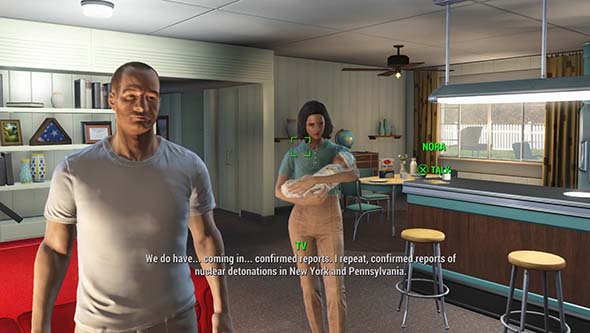
You don't spend enough time in your pre-war home or vault to develop any attachment to the place or people.
After creating your character and setting your S.P.E.C.I.A.L. stats, you and your spouse immediately flee with your infant child to the neighborhood vault. Once inside, you're handed the trademark silly superhero pajama jumpsuit and then promptly cryogenically frozen. You awake to witness your spouse get murdered and child kidnapped by apparent raiders, but then get frozen again. Then you awake again to do the combat tutorial against radroaches before leaving the vault and starting the game proper.
You spend virtually no time in the pre-war time period; you don't bond at all with your spouse or child; you don't establish any connections with your home or neighbors. There is absolutely no emotional bond between the player and what is lost in the war. So when the game drops you in the wasteland with a dead spouse, a missing child, and a quest to track down the kidnapper/killer, it does so without creating any emotional connection or investment for the player. I could go to Concord and then to Diamond City and search for my son, or I could just wander off in any random direction fighting raiders and painstakingly building my own little settlement out in the middle of nowhere using salvaged car tires and scrapped raider armor. Fallout 4 doesn't waste any time taking a nose-dive into the open world limbo.
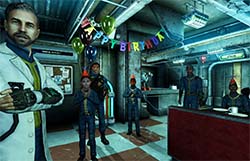
Fallout 3 simulated an entire childhood in the
vault, with friends, family, and even bullies.
Compare this against Fallout 3's prologue. It spent a considerably longer time developing your character and immersing you in the vault. Your dad (voiced by Liam Neeson) plays with you as a baby to teach movement and camera controls, he teaches you how to shoot, and throws a surprise birthday party for you. You interact with a childhood friend, other vault dwellers, and even a bully in order to tutorialize persuasion and speech checks and learn how to solve conflicts without violence. You even go to school and take a test to determine your default skills. In the short amount of time in the vault, you've lived a montage of an entire life.
With only a little bit of buy-in from the player, Fallout 3's Vault 101 becomes a living, breathing place populated with people who you can relate to and care about. You, as a player, have an investment in it and the characters that inhabit it. So when shit happens and you have to leave the vault, it's a monumental moment, and the events of your life, and the decisions that you've made, will shape your character's development over the rest of the game.
Even Skyrim gave the player interesting role-play decisions in its tutorial by required your character to make an immediate decision to follow the imperials or the Stormcloaks (though the scenario makes that decision a pretty one-sided one). And your initial choices of weapons and battle tactics would level up those specific skills; thus, starting the character down a path towards specializing in those skills as the game progressed (though you were completely free to change all that if you want).
And Fallout 4 has a perfect opportunity to take that father / son dynamic from Fallout 3, and invert it! The game could have opened with the birth of the baby. Since Bethesda had to record dialogue for multiple names for the player character, they could just as easily have done the same with the child's name. The doctor could hand you a paper with "This Year's Popular Baby Names", and you could chose one of those names that were explicitly recorded in dialogue. You could even be given the option to type your own name and replace the child's name with "my son" in dialogue. You could fill out the child's name and your own character's name on the birth certificate. Naming the baby would create a sense of ownership and connection to the child that might help encourage the player to pursue the main quest.
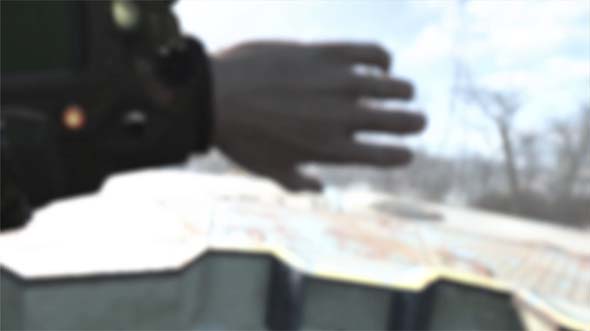
Fallout 4's vault serves only as a combat tutorial with no depth, emotional resonance, or meaningful decisions.
But it doesn't have to stop there... [More]
0b31d11f-77e0-4ddd-b277-8b1e013b818d|0|.0
Tags:Fallout, Fallout 4, Bethesda, RPG, Boston, commonwealth, minuteman, minutemen, wasteland, post-apocalypse, nuclear weapon, nuclear war, NPC, Dogmeat, power armor, crafting, ludonarrative dissonance, open world, sandbox, raider, synth, android, slavery, underground railroad, freedom, rights, morality, ethics, family
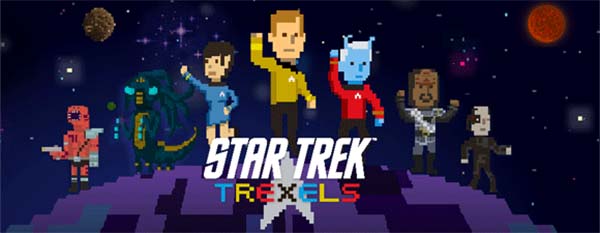
I finally got around to buying a modern phone, upgrading my Galaxy SII to a Galaxy S6 Note Edge. With the upgrade in tech, I've finally started trying out some of the free-to-play mobile games that are flooding the market. I had already played SimCity Buildit on my previous phone, but its poor performance and bugs held me back from bothering with any other games on that old SII. But now that I have a new phone, I wanted to try the Star Trek-themed game Trexels.
Star Trek games are few and far between, and good ones are virtually unheard of. Probably my favorite Star Trek game ever was the Windows 98 4x-strategy game Birth of the Federation, which was basically just a Trek reskin of Microprose's Master of Orion II. It wasn't the most technically proficient of games, and the A.I. blatantly cheated, but it was a game that captured the essence of Star Trek by being primarily about exploring the galaxy and colonizing new worlds. Most Trek games are content to just be reskins of shooters or space combat games, which always feels out of place. So Birth of the Federation, despite its obvious flaws, has always stood out to me as a game that really felt like one of the most appropriate uses of the Star Trek license for a video game.
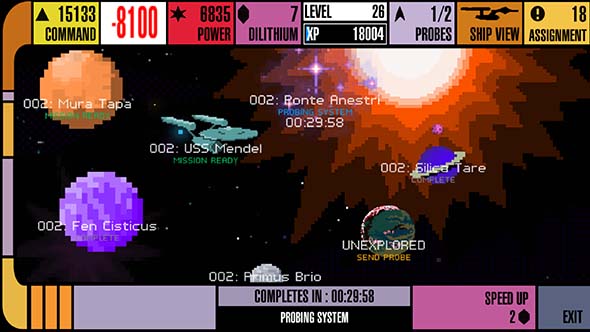
Finally, a Star Trek game that's about exploring space, rather than just shooting things!
And that brings us to Trexels, a free-to-play mobile game that is about exploring space while developing the skills of your ragtag crew and completing the construction of your ship. Sounds like a Star Trek-worthy premise. At least it isn't a first-person shooter. You start the game with a mostly-empty ship and handful of crew members. Your task is to build infrastructure in the ship to allow you to acquire new crew and harvest resources (including "command point", "research", "power", and "dilithium").
To boldly grind...
Resources are harvested by assigning crew to work the relevant rooms, and then you wait some period of real time for the crew to complete the assignment so you can collect the resource. You spend your accumulated resources to build new rooms in the ship, train your crew to increase their ability points, and attempt missions. Completing missions rewards you with experience and ... more resources? So it's kind of circular: you spend resources to attempt mission, and then are rewarded with some of the resources that you spent.
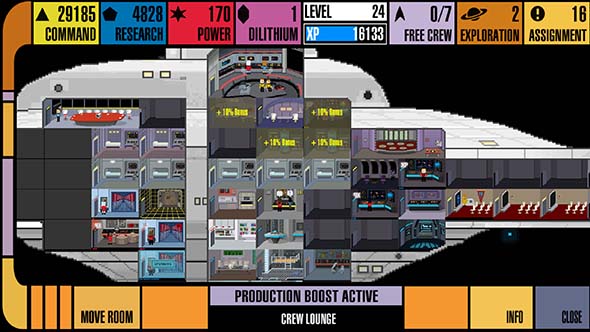
Your crew harvests resources from specific rooms, and other rooms unlock abilities and power-ups.
You also gain general experience, which doesn't really do much other than to unlock new expansion slots for rooms in your ship. Virtually everything you do gives you experience, so you level up fairly quickly. I always have way more available expansion slots than I can possibly use due to the slow rate in which you acquire resources. Once you get past the very first few missions and room-construction, the game really starts to turn into a slow, slogging grind... [More]
97535ad4-7e52-48fc-bff8-8d9b5c2f63d7|2|4.0
Tags:Star Trek, Trexels, YesGnome, xCube Games, construction management, exploration, space, crew, ship, TOS, social gaming, mobile gaming, mobile, iOS, android
|

| 12 | | | | | | | 60 | | 11 | | | | | | | 55 | | 10 | | | | | | | 50 | | 09 | | | | | | | 45 | | 08 | | | | | | | 40 | | 07 | | | | | | | 35 | | 06 | | | | | | | 30 | | 05 | | | | | | | 25 | | 04 | | | | | | | 20 | | 03 | | | | | | | 15 | | 02 | | | | | | | 10 | | 01 | | | | | | | 05 |
|